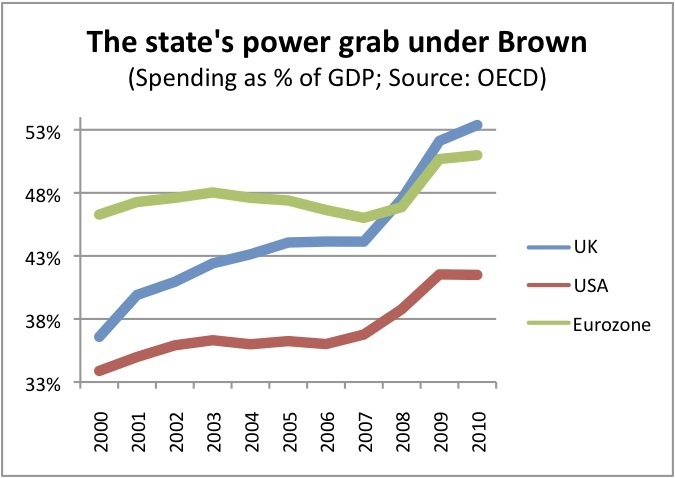Gordon Brown may have been defeated, but you can hear his voice in the broadcast reports this morning about the £6 billion cuts which George Osborne will mention today. The BBC was still expressing this in terms of frontline service cuts – the equivalent of 150 schools, apparently. This was the root intellectual error which sent Britain on the path of fiscal ruin – the idea that extra spending magically means extra, better services. If that were true, Britain should have the best schools on the planet and healthiest population in the world, given that our spending over the last decade years increased, quite literally, faster than any other country over any other postwar decade*.

Source: OECD
George Osborne is not even reversing this. He’s slowing it down. Spending will still rise in Britain, but just not by so much. Is it such a hard concept to sell? When the Tories were in Opposition they felt powerless to challenge the Brown narrative. When Tory policymakers were asked they didn’t advocate a reversal in the stunning, never-seen-outside-Weimar-Germany expansion in state spending, they would shrug and say that government always set the terms of debate. There is not much Opposition can do about this. They can huff and puff, but their analysis would never be able to supplant that of the government.
I was never convinced by this argument. Labour was setting the terms of the economic debate from Black Wednesday onwards. The sheer brute force and clarity of the Brown position, even in opposition, meant that even Tory ministers were talking about “investment” rather than spending. When even the ECB was talking about “expenditure reform” (ie, cuts) the Tories had concluded that such an agenda was beyond political possibility. The parameters of what they regarded as political possibility had been drawn by Brown. Like a sheepdog, he had manouvered the Tories into the high-spending arena – and now the sheepdog has gone, they are loathe to break out to their old pastures.
Now that Brown has gone, the Tory party can be released from his spell. They can start to think, and argue, for themselves once more. The time has come for the Conservatives to demonstrate what they always argued in Opposition: that government sets the terms of debate. Osborne told BBC Breakfast today that the cuts were needed – amongst other things – to prevent a rise in interest rates, which he was “determined” not to see happen. He should be careful of such language. Rates are rising substantially – cuts will simply serve to delay these cuts. Citibank has given its own estimation below about the extent to which the Tory fiscal action will delay rate rises, but not stop them rising sixfold over the next few years:
BoE Base Rate, Actual and Forcecast, 2007-2015

Instead Osborne should say that these cuts, while regrettable on one level, are necessary on another. That high government spending makes everyone poorer, makes society less free and less fair, and
that the Tory party is about to rebalance power away from government and towards communities. This means government taking less money away from communities, through tax. And the cut in spending is
a tiny first step to a far bigger redress in the power balance. There is a moral case for cuts – spending cuts first, tax cuts second – and it is one that George Osborne should lose no
time in making.
* I first heard this point made to me not at a think tank or from a Tory, but by Nick Clegg at a reception by CentreForum, a Lib Dem think tank, about three years ago. The British state, he said, had expanded faster than any other over the last decade and this was a threat to the free society. I quite agreed, and wished more Tories made the point in such terms. So there is cause to believe that the moral case for cuts is one which this coalition can make together.







Comments